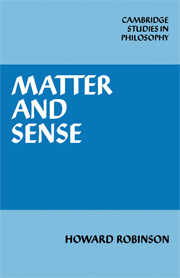Book contents
- Frontmatter
- Contents
- Acknowledgments
- 1 The materialist's problem and some non-reductive solutions
- 2 Supervenience and reduction
- 3 Behaviourism and stimulus materialism
- 4 The causal theory of mind
- 5 The disappearance theory
- 6 Reductive theories of perception
- 7 Matter: turning the tables
- Conclusion
- References
- Index
7 - Matter: turning the tables
Published online by Cambridge University Press: 07 May 2010
- Frontmatter
- Contents
- Acknowledgments
- 1 The materialist's problem and some non-reductive solutions
- 2 Supervenience and reduction
- 3 Behaviourism and stimulus materialism
- 4 The causal theory of mind
- 5 The disappearance theory
- 6 Reductive theories of perception
- 7 Matter: turning the tables
- Conclusion
- References
- Index
Summary
INTRODUCTION
It is generally agreed that material bodies are extended in space they are three-dimensional objects. In the Second Meditation Descartes maintained that being extended was the essence of body, but most philosophers have been inclined to deny that extension alone is what constitutes body, for a body is something more than a bare geometrical figure. A bare geometrical figure is just a volume of empty space, but those spaces in which bodies are located are not empty but occupied. A body occupies a space in the sense that while it is located in that space no other material body can be located there: to occupy space is to exclude other bodies. It would seem that bodies must of necessity possess some property or properties over and above their geometrical properties; there must be something further which constitutes their materiality, their power to occupy the space in which they are located.
Locke recognised the need to characterise bodies more fully than they are characterised in Descartes's definition, and he saw that their materiality consisted in their ability to occupy space to the exclusion of other bodies. Consequently he introduced as his other essential and intrinsic characterisation of body the property of impenetrability, which just is the capacity of one body to prevent another body from occupying the space it occupies itself, whilst it occupies that space itself (Essay, 11, 8, 23).
- Type
- Chapter
- Information
- Matter and SenseA Critique of Contemporary Materialism, pp. 108 - 123Publisher: Cambridge University PressPrint publication year: 1982



